I don’t know if anyone wants a little history lesson, but here is one example of what happens when you don’t have a US constitution!
In Denmark, Danish absolutism was established in the mid-17th century. The transition to absolutism occurred in 1660, following a series of military defeats and financial crises that weakened the traditional power structures within the country. Frederick III played a big role in this.
In the late 1650s, Denmark was embroiled in wars with Sweden, which left the country economically devastated and politically unstable. The Treaty of Roskilde in 1658 had already forced Denmark to cede significant territories to Sweden, and further conflict led to additional strains. By 1660, Denmark was broke, with King Frederick III deeply indebted.
So Far, sounds like USA Today!
Frederick III declared a state of emergency in 1660 to get the nobility to agree to reforms. The king called an Assembly of the Estates of the Realm, which included nobility, clergy, and burghers. The assembly was supposed to fix the kingdom's finances.
During this assembly, a significant shift occurred when the clergy and burghers allied against the nobility. They proposed abolishing the elective monarchy in favor of a hereditary one, effectively granting Frederick III absolute power. This proposal included removing noble privileges such as tax exemptions.
Despite strong opposition from the nobility, Frederick III supported this proposal. He declared martial law in Copenhagen and used military force to suppress dissent. By October 1660, under immense pressure, the nobility capitulated, and Frederick III was offered the hereditary throne. With no Checks and Balances…here we go the way of Denmark.
What common threads in history run through situations like this? Hmmm… seems like it always happens when you have lots of debt, too much debt, a debasement of the currency, and people with little or no power versus the elites with all the power.
In recent history, you might remember Venezuela: Venezuela's shift toward authoritarianism under tyrant Maduro. The country faced an unprecedented economic crisis due to plummeting oil prices and mismanagement, which led to hyperinflation and severe shortages of basic goods. To deal with the crisis, Maduro suppressed opposition, postponed elections, and created a new legislature instead of the one controlled by the opposition. You might've seen some of these people in your neighborhood, since 25% of Venezuelans have fled the country. Men and women who might've been doctors or professors or mid-level management people in Venezuela might be living as prostitutes on the Columbian border or now figuratively “eating cats and dogs” somewhere in Ohio.
Or how about Germany: After World War I, Germany faced severe economic challenges, including hyperinflation and reparations payments under the Treaty of Versailles. These conditions contributed to political instability and the eventual rise of Adolf Hitler and the Nazi Party, which established a totalitarian regime.
Or maybe you've read ''It was the worst of times, it was the best of times. or War and Peace and wondered how many people died, or why they died… but remember The French Revolution was triggered by a financial crisis due to too much DEBT and poor fiscal management. The revolution led to the overthrow of the monarchy and eventually resulted in Napoleon Bonaparte's rise to power as an authoritarian ruler following his coup d'état in 1799.
Or maybe just ancient Rome, around 133–44 BC. Lots of debt led to increased reliance on military leaders like Julius Caesar, who eventually became dictator. It was Caesar who shifted power from individual to autocratic rule, eventually leading to Augustus' Roman Empire.
The list goes on and on. And while we are in deep trouble here in the United States of America, with massive debt and a generation or two of younger people who learned almost nothing in public schools— we still have a chance turn things around because of the geniuses who lived and for around 1776.
Hello!















Share this post